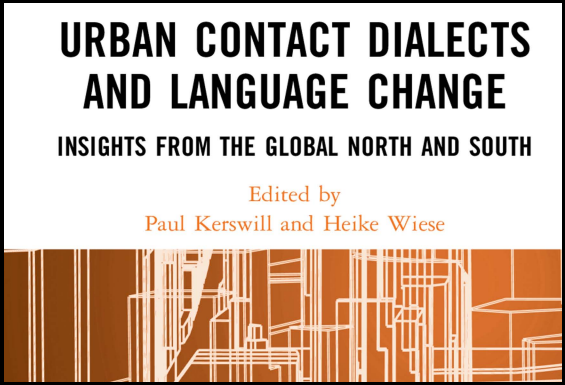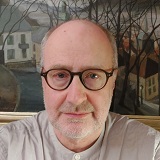Urban Contact Dialects and Language Change: Insights from the Global North and South
IGDC Member Paul Kerswill explains in this blog how his book 'Urban Contact Dialects and Language Change: Insights from the Global North and South' came about and what it covers.

IGDC Member Paul Kerswill (emeritus professor, Language & Linguistic Science) along with Heike Wiese (professor, Humboldt University, Berlin) have recently published Urban Contact Dialects and Language Change: Insights from the Global North and South Routledge, 2022. In this Blog Paul explains how the book came about and what it covers.
The last three or four decades have seen large-scale, rapid migrations to metropolitan areas right across the world. Closely connected to the social and economic issues raised by these population movements are the no less significant linguistic changes this entails. These range from a sharp increase in multilingualism to the rise of new versions of existing languages, or indeed new languages.
Heike Wiese and I both have considerable experience of investigating the kind of language changes which result from these migrations, she in Berlin and I in London. The interest for us is to see how the second generation – the children of the migrants – respond linguistically to the melting pots they grow up in. The short answer is that, right across (northern) Europe, there are now new, multiethnic versions of the majority languages – for instance, so-called Kiezdeutsch in Berlin and Multicultural London English in London.
Routledge approached us with the suggestion that we might produce a compendium of these situations. We willingly agreed, not least because it would enable us to cast the net much more widely, beyond Europe. We looked to countries in Africa South of the Sahara because it was clear that similar migrations were leading to different linguistic outcomes, with new linguistic styles emerging from youth languages originally intended to exclude other people, or even from criminal argots. Our watchword was not so much North versus South, but rather the distinction between countries with a powerful majority language, such as English, French or German in the UK, France and Germany, and highly multilingual countries with an ex-colonial official language and myriad indigenous languages.
We approached authors from both North and South and asked them to describe the situations in the countries they had themselves researched. Our roster of countries begins with Cameroon, where a new, informal version of French, Camfranglais, is becoming popular even though it is scarcely intelligible to French speakers in France. We then move to Senegal, the DRC, South Africa, Ghana, Kenya, Finland, Tanzania, Denmark, Norway, the Netherlands, Sweden, France, the UK and Germany.
The chapters have identical structures, making comparisons possible – this is done through four invited commentary chapters. We were frequently astonished at the differences between countries within the same continent, and the similarities, too, often between countries in different continents.
From the point of view of global development, a particular interest lies in the way our authors explain how the languages are embedded in the social and economic systems of each country, as well as their specific histories.
| Featured Researcher | Paul Kerswill |
|---|---|
|
|
Paul is Emeritus Professor of Sociolinguistics in the Department of Language and Linguistic Science. His main research has been on the linguistic effects of migration, starting with his doctoral research in Norway on rural migrants in the city of Bergen, followed four ESRC-funded projects on the development of a new dialect in the New Town of Milton Keynes and, latterly, on the development of ‘Multicultural London English’ in the high-migration, multilingual and less affluent parts of the East End of London. |
Contact us
Interdisciplinary Global Development Centre
igdc@york.ac.uk
01904 323716
Department of Politics and International Relations, University of York, Heslington, York, YO10 5DD, UK
Twitter
Contact us
Interdisciplinary Global Development Centre
igdc@york.ac.uk
01904 323716
Department of Politics and International Relations, University of York, Heslington, York, YO10 5DD, UK
Twitter
